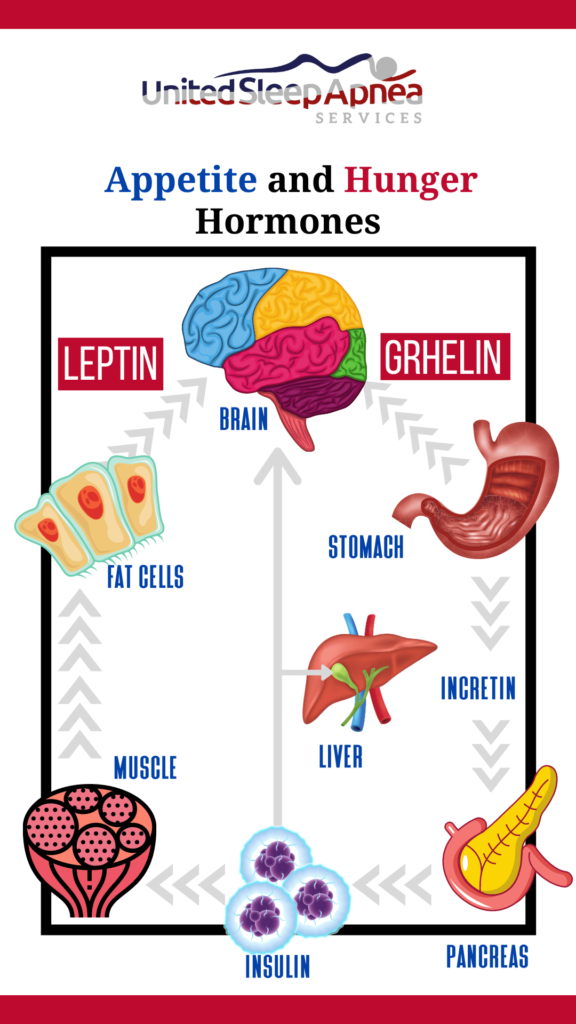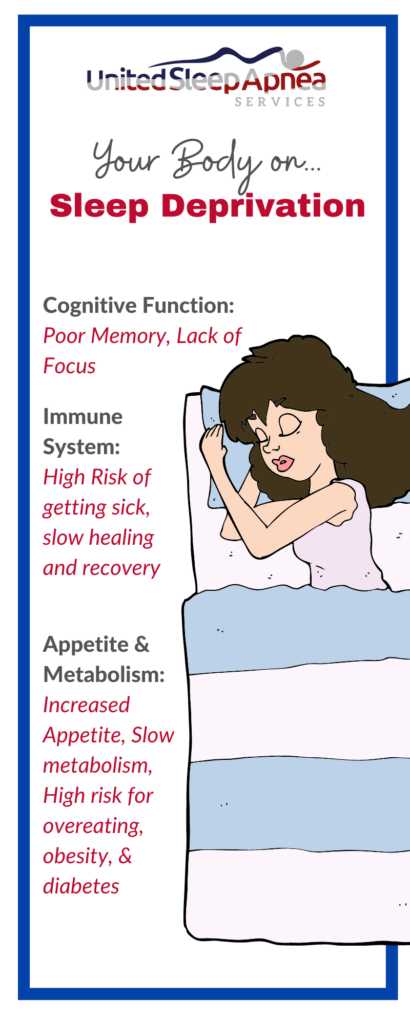What is the Ghrelin Hormone?
Ghrelin, also called Lenomorelin, acts as an orexigenic hormone that primarily regulates the feelings of hunger and appetite in your body. Other than the role of hunger, the hormone is involved in various anabolic and metabolic activities between the stomach and the brain.
In simple terms, the higher your ghrelin levels in the bloodstream, the higher your hungrier feeling, and vice-versa. We will discuss this hormone in detail, and how without adequate sleep, it can affect this important hormone, throwing it out of homeostasis.
Secretion and Circulation of Ghrelin (GHRL)
Where is ghrelin produced? Predominantly, stomach cells produce the ghrelin hormone and secrete it into the bloodstream. Over the years, many studies claim that peripheral tissues of the small intestine, gastrointestinal tract, brain, ovary, pancreas, and adrenal cortex produce the ghrelin hormone besides the stomach.
The secretion of the ghrelin hormone by the stomach greatly depends on the food intake or the nutritional state of your diet. Also, the synthesis of the ghrelin hormone exhibits a diurnal circadian rhythm. Yet, the synthesis might vary with age, gender, level of the growth hormone, the body mass index, blood glucose, and insulin levels.
Once secreted into the bloodstream, the hormone reaches the hypothalamus of the brain (ghrelin-receptors). With the help of the central nervous system (CNS) signaling, the hormone stimulates the brain to communicate to other parts of your body about the lack of energy reserves and the need for food intake.
Ghrelin: What does it do
Though the ghrelin hormone’s primary function deals with hunger and appetite, it plays a vital role in many other body functions.

Primary Functions:
- Stimulates appetite and lets you consume more food and calories
- Through food intake, it enables the storage of energy reserves (importantly, fat)
This way, the hormone helps in the short-term regulation of food intake and long-term regulation of energy reserves and energy balance.
Secondary Functions:
- Affects your sleep/wake cycle: Higher ghrelin levels may wake you up for food intake.
- Involves in reward-seeking: This happens in the case of hedonic eating where individuals eat for pleasure instead of the real need. Ghrelin plays the mediator role between the stomach and brain in this case.
- Acts as both stimulant and inhibitor to neurons: The ghrelin hormone inhibits POMC neurons and CRH-producing neurons and stimulates NPY, AgRP, and orexin.
- Regulates the cardiovascular system.
- Carbohydrate metabolism: to store the energy, the ghrelin hormone helps in the metabolism of carbohydrates.
- Modulates the functioning of different brain peptides (hypothalamic proteins) to regulate food intake and body weight.
- Influences taste sensation: By increasing appetite, the ghrelin hormone may sometimes induce the sensation of tastes that further increases appetite.
- Influences the release of growth hormone: The ghrelin hormone involves the release of the growth hormone from the pituitary gland that helps in the building-up of muscles.
- Regulates the insulin release into the bloodstream.
- In a few cases, the ghrelin hormone participates in the formation of cancer cells and the metastasis process.
An in-depth study that analyzes the functions of the ghrelin hormone other than the role of hunger initiation lists the regulatory functions, involving glucose homeostasis, gluconeogenesis or glycogenolysis, energy expenditure, muscle differentiation, and fusion, sympathetic nerve activity, bone formation, and metabolism.
An article published in the medical news forum discusses the role of ghrelin in sexual behavior. The article quotes a study involving experimentation with mice, which states increased ghrelin concentrations caused an increase in sexual behavior. Experts suggest a fresh study to involve humans in the next stage of experimentation.
Wanted to know the other functions of the ghrelin hormone? Stay tuned with us on Facebook, Twitter, and other social channels…
Ghrelin: Regulation—Deficiency and Surplus
As ghrelin levels are directly associated with food intake, its synthesis primarily is regulated by the food intake as well. The circulation of ghrelin levels increases before every meal or when you undergo fasting. Hence, the ghrelin hormone is referred to as the “hunger” hormone.
When it comes to food intake, it is the proteins and carbohydrates that are majorly involved in responding to hunger. Thus, when the protein or carbohydrate content in your body increases, the ghrelin levels reduce accordingly. Though fat intake contributes to food intake, it does not considerably affect ghrelin syntheses like proteins and carbohydrates.
Since food intake regulates the ghrelin hormone synthesis, the hormone plays a vital role in regulating body weight over a longer period and not on a per meal basis. Hence, the overall weight gain or loss relates to the ghrelin levels besides other factors like sleep, higher fat intake, etc.
Researchers have also found that somatostatin and other hormones released as the by-product of digestion inhibits the secretion of the ghrelin hormone.
Hyper-Synthesis of Ghrelin
When your body starves for food intake, and there are proteins or carbohydrates subjected to metabolic activities—your stomach produces the ghrelin hormone, which increases the appetite for nutrition. This gives individuals a feeling of hunger, upon which food intake initiates.
Patients suffering from cachexia(severe chronic illness) might show higher levels of ghrelin secretion. Also, in the case of Anorexia Nervosa, an eating disorder, these patients exhibit abnormally higher levels of ghrelin.
Prader-Willi syndrome, one of the genetic diseases shows a strong correlation with the ghrelin hormone. The syndrome affects patients with obesity and excessive feelings of hunger. Adversely, these patients will have higher ghrelin circulation even before they start getting obese. This condition increases the severity of the syndrome more than expected.
Hypo-Synthesis of Ghrelin
In normal conditions, people with higher body weight and BMI tend to have lower ghrelin circulation levels in their bloodstream. When compared to lean or thin people, ghrelin levels are lower for the high bodyweight individuals. This justifies the fact that ghrelin does not decide the factor that causes obesity in highly weighted individuals. It’s just that higher weight individuals are excessively sensitive to the ghrelin levels.
Patients undergoing gastric bypass surgery will have a reduced sized stomach compared to normal or healthy individuals. Studies on these patients reveal that the lower ghrelin levels in these individuals seem lower than that of those individuals who have lost weight by other means instead of undergoing bypass surgery.
Sleep and the Ghrelin Association
Though the ghrelin hormone came into the limelight just two decades ago (in the year 1999), researchers have conducted numerous studies concerning its synthesis, secretion patterns, and association with other body rhythms, like sleep deprivation and appetite.
Research published in the International Journal of Endocrinology infers that the ghrelin concentrations show a circadian pattern like other hormones such as; cortisol, melatonin, and leptin. The study found that the highest concentrations of ghrelin levels in the bloodstream occur during the daytime (routine hours) and the lowest concentrations occurring occur at night (no food intake due to the body’s sleeping cycle).
Evidence that Relates Sleep with the Ghrelin Hormone
A news medical topic states that people living in industrialized countries have reduced their daily sleeping duration by half an hour to one hour. And this reduction in sleep duration links to an increase in obesity chances, which, in turn, can affect the metabolisms, food intake pattern, and weight gain.
The article also quotes the study of a set of workers whose average duration of sleep fell, to less than 7 hours and showed a higher BMI, increased leptin levels, and reduced ghrelin levels.
Another study, which analyzed the role of leptin and ghrelin in food intake regulation, states that obese individuals who lacked sleep exhibit a higher leptin level (anorexigenic) and lower ghrelin levels (orexigenic hormone).
Researchers have also examined the role of light (illumination during nocturnal sleep) that influences the ghrelin levels in the bloodstream. The study inferred that the light induces a circadian phase shift that altered the secretion of both leptin and ghrelin. This way, it’s clear that ghrelin levels vary with the sleep cycle (delayed circadian rhythm due to illumination).
WASO refers to the duration of wakefulness that occurs after the onset of sleep. This WASO serves as a primary parameter that measures sleep fragmentation, a symptom of a sleeping disorder. Research published in the weekly PLOS Medicine investigates the relationship between sleep efficiency, short sleep, and WASO with the circulating ghrelin levels.
Researchers in the study found a significant correlation between ghrelin and WASO. Those with WASO who had shorter sleep durations showed higher levels of the ghrelin hormone.
Enough experimental studies have been conducted to examine whether sleep deprivation affects the synthesis and secretion of the ghrelin hormone. One such study involving 12 young men stated that sleep deprivation greatly affects the ghrelin levels and the level of appetite and hunger the body felt.
Sleep Deprivation and Ghrelin:

Scientists have found that ghrelin levels increase primarily due to acute sleep deprivation. They also discovered that a single night of sleep deprivation may immediately influence the ghrelin levels to increase, but does not considerably affect the leptin levels.
Empirical studies also revealed that ghrelin levels vary significantly (inversely proportional) with the duration of sleep.
Insomnia and Ghrelin
Researchers conducted experiments on chronic insomnia patients to analyze the release of nocturnal ghrelin levels at night.
- The results show a consistent decrease in the circulating ghrelin levels in insomnia patients compared to healthy individuals who had normal sleeping cycles and circadian patterns.
- The researchers also found in the study that the decrease in the ghrelin levels at various nocturnal instances (11 pm, 2 am, and 6 am) might have arisen due to the autonomic nervous system (ANS).
In specific, researchers claim that the decrease in the efferent vagal (vay-gul) activity or signaling may contribute to the variations in the majority.
Obstructive Sleep Apnea
A study published in the European Respiratory Journal analyzed the ghrelin levels in patients suffering from Obstructive Sleep Apnea (OSA). The results unveiled a significantly higher concentration of circulating ghrelin levels in the bloodstream of these patients compared to the ghrelin levels of healthy individuals.
The study also found that OSA strongly relates to higher chances of obesity and higher BMI than those individuals who are obese. Also, as OSA paves the way to hypertension, the ghrelin levels vary proportionally to the level of hypertension.
Why is Ghrelin important, and how do you fix it?
With so much importance, the ghrelin hormone has several major roles to play in hunger, appetite, and food intake. Though lower variations in the circulating level of ghrelin do not affect the food intake or hunger on a significant level, it might have a great impact if the situation persists over weeks, months, or years. Hence, paying attention to the ghrelin hormone paves the way for healthy signaling and the regulation of food intake throughout your life.
Having also seen the effect of sleep over the secretion of ghrelin levels, it becomes your utmost responsibility to take care of your sleep, including your sleeping cycle and duration. If you’re skeptical about your sleeping behavior, please get it checked so that you don’t fall prey to any ghrelin-related disorders or biological problems.
Are you sleep-deprived? Wanna check your sleep quality? Take our Epworth Sleep Scale test!



Great post